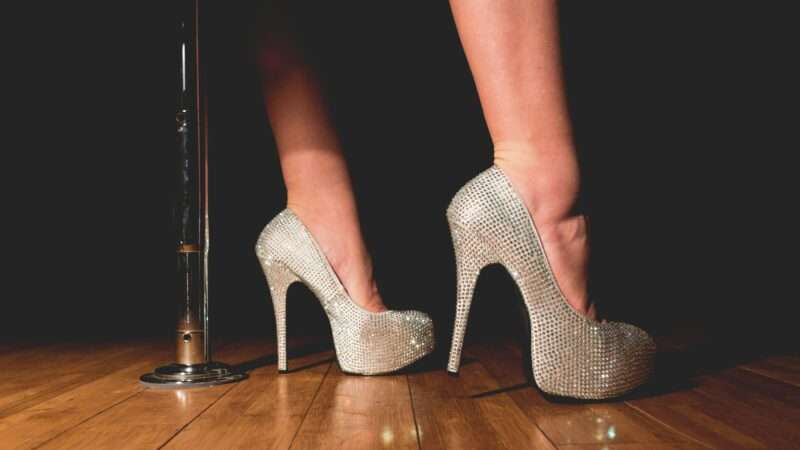Florida Lawmakers Vote To Raise Stripping Age to 21

Florida celebrated International Women's Day last week by treating the state's young women like children. On Friday, state lawmakers approved a bill banning 18- to 20-year-olds from being strippers or from working in any other capacity at an adult entertainment venue.
Like a similar bill passed in Texas in 2021, the Florida bill claims to be a blow against human trafficking. As with so many attempts to "protect" people from sex work, this one has major potential to backfire and make abuse and exploitation worse.
It's also part of a growing movement across the U.S. to push up the boundaries of childhood, making all sorts of things once legal for 18- to 20-year-olds now off limits.
Felony Failing To Spot a Fake ID
Under the new measure, Florida adults under age 21 will be barred from working at strip clubs, burlesque establishments, adult bookstores, or any other businesses that fit under Florida's definition of adult entertainment. Currently, people can do so legally upon turning 18.
On March 5, the Florida Senate voted nearly unanimously to raise this minimum age to 21. Only three senators voted no. A few days later, only three members of the Florida House voted against it.
The measure is now with Republican Gov. Ron DeSantis. If he signs it, the law will take effect July 1.
Young adult strippers and adult venue staff would not themselves be subject to penalty. Rather, the bill would make it a crime to knowingly employ, contract with, or otherwise permit someone under age 21 to work in these businesses.
Doing so would be a second-degree felony—punishable by up to 15 years in prison and/or a fine of up to $10,000 if the young person shows any part of their butt, (female) breast, pubic area, or genitals "with less than a fully opaque covering," or shows "covered male genitals in a discernibly turgid state." It would be a misdemeanor of the first degree, punishable by imprisonment of up to a year and/or a fine of up to $1,000, if the young person remains fully clothed.
And it doesn't matter if an establishment is tricked by a fake ID.
"For purposes of this section, a person's ignorance of another person's age or a person's misrepresentation of his or her age may not be raised as a defense in a prosecution for a violation of this section," the bill states. (It also says the employment must be done "knowingly," so it's unclear exactly how these two standards can coexist, unless you take knowingly to simply mean "you knew the person worked there" but not necessarily "you knew they were under 21.")
A person who uses a fake ID to get a job wouldn't be punished at all, mind you; only the folks who fail to catch this deception are in trouble. It's a topsy-turvy view of criminal liability, in which someone who intends to break the law is innocent and someone trying to follow it is guilty.
Basically, the only way for an adult business to avoid liability under this law is to run background checks on all workers or contractors or avoid allowing anyone who seems even remotely young to work.
Worse still, liability doesn't stop at the person who does the hiring or runs the business: It extends to "an owner, a manager, an employee, or a contractor" who lets the young adult work. Theoretically, this means anyone employed at a strip club where an under-21-year-old worker slipped through the cracks could be liable for not reporting it.
'Sex Slavery' Panic, Again
Florida lawmakers say the measure is meant to stop sex trafficking. (Sex trafficking is legally defined as prostitution involving force, fraud, coercion, or minors.) Young adults working at strip clubs are "likely to be trafficked and sold into prostitution and sex slavery," Rep. David Borrero (R–Doral) said during legislative debate. "We ought to be on the side of young girls who are barely legal."
But neither Doral nor anyone else marshaled evidence that strip clubs are sites of "sex slavery," nor that requiring strippers to be 21 or older could put a dent in this supposed scourge.
Even if sex trafficking is an issue at strip clubs, it's unclear by what mechanism barring young adults from stripping would stop it. The whole thing with criminals is that they don't tend to care what the law says. Are we really supposed to believe that someone willing to force someone else into prostitution will suddenly stop because their victim can't legally work at a strip club?
If a young woman is being coerced into sex work, she will almost certainly still be victimized after this law takes effect. But now that will take place in a more private venue, with fewer people around who might help the victim.
Likewise, if a young woman is independently determined to do sex work, this likely won't stop her. But instead of working in a relatively safe setting such as an official strip club, she may choose to work at an underground venue go into full-service sex work (which is illegal) instead. That is, she'll turn to black market options that increase the likelihood of exploitation or abuse.
I've heard people argue that the issue is actually underage people working in strip clubs, and that raising the minimum age will make it easier to stop this. But again, no one produces evidence that underage strippers are really an issue.
In any event, cops are still going to have to investigate people's actual ages to suss out the validity of any reports that a stripper looks too young. Only now, "too young" will be an expanded category, giving authorities more impetus to drop in for age checks.
Infantilizing Young Adults
In short: Laws like these do nothing to plausibly "stop human trafficking," and they may make it worse. Meanwhile they give the authorities more power to police strip clubs and the people who work at them. Even when a business isn't doing anything wrong, cops can always claim a "tip" that someone looked young to go in and check the identities of people working there.
And there's an even simpler reason why these laws are no good: They impinge on the freedom of young adults for no good reason. Just because some people would prefer a society where no 19-year-old tries to dance sexy for money, it doesn't follow that no 19-year-old should have the right to do so.
"This is just another way for women to be controlled," said Rep. Michele Rayner (D–St. Petersburg) during the debate about the bill last week.
It's also another way to keep defining adulthood up, so that people previously granted most of the rights and responsibilities of adulthood are increasingly defined as legally and morally equivalent to children. These days, 18- to 20-year-olds are often barred not only from drinking legally but also smoking, stripping, and vaping.
These bans should be successful, considering how well the minimum drinking age has stopped young people from consuming alcohol…right? AHAHAHAHA. If anything, setting a minimum age of 21 to legally purchase or drink alcohol has made alcohol consumption among young people more risky. But like the people who look at the failed war on drugs and think we just need to drug war harder, some people see the disaster that is banning college students and other young adults from drinking and think: Yeah, let's try that with more things.
It's madness. But infantilization of young adults is all the rage these days. And then we wonder why so many of them are depressed, anxious, or convinced it's everyone else's job to make them feel "safe."
Today's Image

The post Florida Lawmakers Vote To Raise Stripping Age to 21 appeared first on Reason.com.

